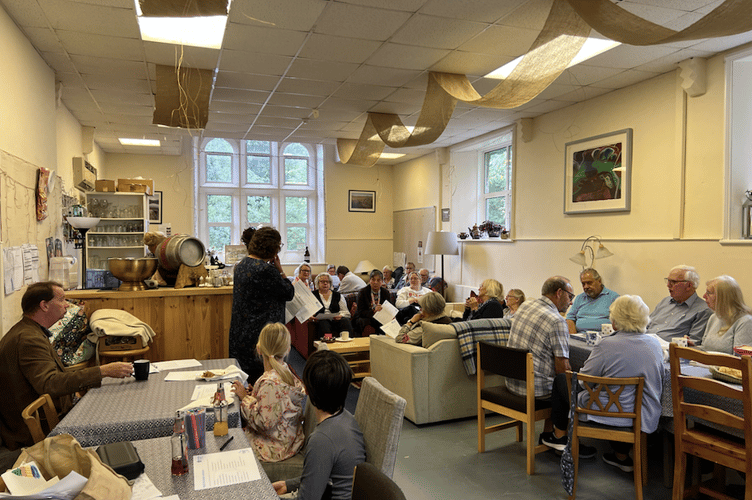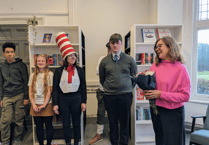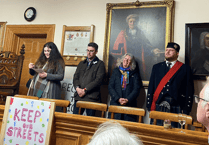"Why me?" That's the question Robin asks himself. 18 months ago he was diagnosed with Lewy Body dementia, meaning that he's had periods of time where he has hallucinated and seen things that aren't really there.
He's in New Radnor, where their Thursday coffee morning looks a little different. A packed room gathers to listen to Claire Jordan and Claire Campbell talk about dementia, on World Alzheimer's Day, and raise awareness of the disease with the community of New Radnor and Presteigne. The event, once completed, means that those who attended can call themselves 'Dementia Friends' and that New Radnor is on it's way to becoming a dementia-friendly village.
Robin was a cartographer, producing maps. He enjoyed seeing the country and exploring the mountains. "I woke up one morning and it's all gone," Robin said. "And I ask myself 'Why me'? I walked over all the hills, and then one day that's gone.
"My wife is amazing," Robin says. "I'm coping okay. Sometimes I can't remember things, and words will disappear. I can't finish a sentence or a poem. But today I feel good. Today I'm centre of attention."
It was organised by Tanya Strange, who is also a resident of New Radnor and a psychiatric nurse with experience in caring for people with dementia.
Robin's wife, Susan, has been by her husband's side throughout the diagnosis and has appreciated the dementia-friendly coffee morning being held in New Radnor. "I think this was a really positive thing to do for the village because I only know one other person who has dementia, and so does my husband, Robin. Without get-togethers like this people have no idea the sort of things we live with when you have dementia. You try and keep life as normal as possible. Some people hide away because of stigmas, which is ridiculous. This can happen to anybody, so it shouldn't have a stigma.
"My husband was having memory problems, and he got a referral to Abergavenny. We've had support from our doctor over that time." Susan says. "It's coming up to two years since his diagnosis."
She has some people around to support her, and offers of help from the community, especially after today.
Claire Jordan, who spoke at the event, said it's important that independence is not taken away from people who are living with dementia. "Listening to people with dementia is key. Give them time to answer if they're trying to remember something. Don't try and finish their sentences, unless the individual wants it. Time is valuable. Talk to the individual normally and don't treat them like they're stupid."

She notes that due to the disease, which affects the brain, you might find that someone who has dementia sees things differently, and processes things differently. For example, in a busy room, someone with dementia will have trouble filtering out the noise. "Consider going to quieter places, with fewer people, or with no distractions in the background. They might see a black mat on the floor as a hole in the ground, and they might get scared about that. They may see polished flooring that shines as a watery floor that becomes a slip hazard. If more people did dementia-friendly training, they would know how to react when and if they encounter someone with dementia who may be acting a certain way. They will know how to help and offer solutions to any anxieties people with dementia may be feeling or experiencing.
"Perception can be affected if you have dementia. Some people lose their peripheral vision, and others lose their awareness of what's happening around them," Claire continues. "People can still see things, but they might not see them how you or I see them."

Both of the Claire's running the event are keen to stress that there is more to dementia than just memory loss. "It's not just about losing your memory. We often associate it with that, but dementia can impact other things, such as cognitive processing, concentration, speech, reading, writing, and communication can be hard. Things like cooking can become harder and you might find that has an effect on their nutrition."
The residents of New Radnor were urged that if they have any concerns about their own cognitive health, they should go to the GP. Because of stigmas around dementia, some people avoid going to the doctor's, out of fear for what it might mean if they are diagnosed. Others may avoid going out of pride, or fear that they will have their independence taken away from them. "It's a big diagnosis to get. Memory loss as you get older is normal. Very often it's not dementia and it might be other things. But if they are diagnosed with it, people may fear having everything taken away from them."
As facts were shared with the community, many people were surprised to find that one in 14 people over the age of 65 have dementia. "It's so important that people become dementia friendly because as we get an ageing population, and people live longer, that number is only going to increase. Meaning that more people will encounter people with dementia."
It's estimated that 4,195 people in Powys over the age of 65 have dementia, while in Wales the number is predicted to be 76,544.
Dementia Friends is a social movement encouraged by the Alzheimer's community, with the aim of creating a friendly community. Claire Jordan, a retired nurse, and Claire Campbell, a volunteer co-ordinator, have become dementia ambassadors, training people around the country. The event was also attended by members from The British Red Cross and Digital Communities Wales.
The hope is that more training events like this can make rural areas in Powys dementia friendly.
"After today's session, people might be able to apply their knowledge to support people with dementia, or pass on tips to those who are supporting someone with dementia," Claire Jordan says. "It's important we know that people can still live well with dementia. When people are diagnosed, they don't immediately have to stop driving, or walking, or ride a bike. Having understanding, and offering support is important. Knowing that you don't have to take away someone's independence straight away unless you really have to is important to know. Some people with early stages of dementia can still be working, and living their regular lives.
"We don't talk about it enough, and it's fabulous that people have come together to talk about this because it can help smooth out any fears and give reassurance to people. That's a powerful thing to have."
Those in the community left feeling enlightened and realised that they learned a lot more about dementia.
"We felt like we learned so much about dementia in a really positive way," one New Radnor resident said. "It's good that the village can become proactive in becoming a dementia-friendly village."
"It was a great turnout," another resident said. "It was very encouraging. I know two people with dementia and the event has helped me understand it better."
For more information on becoming a Dementia Friend, go to dementiafriends.org.uk.
For Robin and Susan, they know that the community of New Radnor have always been there to offer their support. Only now they can be reassured in knowing that the village is striving to become a dementia-friendly village, with a better understanding of the life they live.




